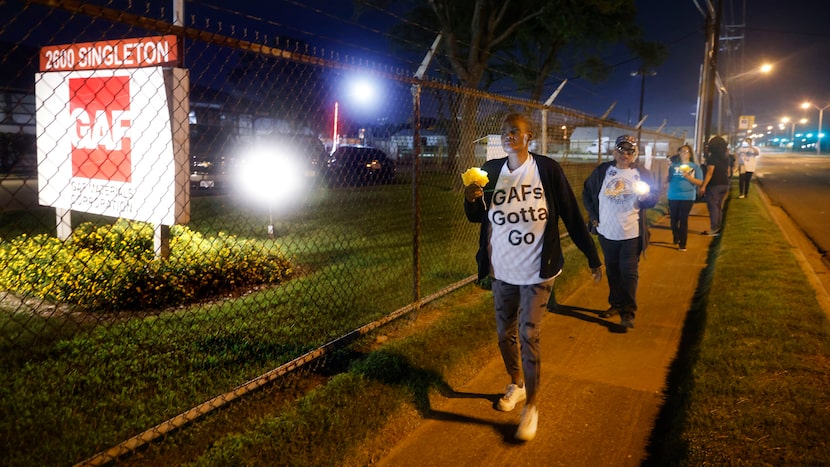Several West Dallas activists are devastated that a commission agreed to present a recommendation to the City Council that would strip residents of their right to petition to close businesses that have proven harmful to their community.
The Dallas Planning Commission on Thursday approved amendments to the Dallas Development Code to align the city’s write-off process for closing businesses that negatively impact neighborhoods with Senate Bill 929, a new state law that provides more protections for business owners. The state law, approved in May 2023, allows affected businesses to seek payment for losses.
But the changes approved by the commission, and which are due for final approval by the City Council, would also take away residents’ rights to file petitions to close businesses.
RELATED: Dallas may eliminate residents’ right to petition to close harmful businesses
Breaking News
Janie Cisneros, a leader of the West Dallas community group Singleton United/Unidos, called the vote “disturbing.”
“I can’t believe that the city we live in would willfully victimize its most vulnerable residents,” Cisneros said. “This is discrimination on a pure and simple level.”
For about four years, Cisneros has been working with local activist groups, including GAF’s Gotta Go (GAF Vete Ya) campaign, to get the roofing company GAF to move out of its West Dallas facility on Singleton Avenue and stop harmful emissions of sulfur dioxide and particulate matter that are said to be negatively impacting nearby residents.
GAF has said it plans to close in July 2029, but neighbors want to be evicted sooner.
The dispute began on Oct. 3, when Cisneros tried to apply for a GAF write-off but was told the Board of Adjustment would not accept the application due to new state law.
GAF did not respond to a request for comment.
In the past, write-offs have allowed for the closure of, say, a car wash after multiple failed attempts to curb drug crime, or a small auto repair shop that had been in place for years when city planners pushed through new zoning.
RELATED: Study finds west Dallas residents more exposed to air pollution than other parts of the county
Late last year, the Zoning Ordinance Advisory Committee approved the city attorney’s recommendation to amend the ordinance, despite several residents expressing opposition to the ordinance and its provisions that would limit residents’ right to petition for depreciation.
The recommendation will then go to the City Planning Commission, with the City Council having the final vote on updating the development code.
“The idea of taking away the citizens’ right to have a say is, I think, a false choice,” said District 10 City Planning Commissioner James Houseright.
“There are many avenues and opportunities to voice your opinions, air your grievances, attend city council meetings, vote to remove city council members from office, and many more.”
Some committee members said their hands are tied by SB 929 and that the bill is a direct attack on Dallas.
District 7 Commissioner Tabitha Wheeler Reagan, who represents South Dallas, said she does not support the recommendation because she is against taking away residents’ rights to seek the procedure.
“This is a terrible situation,” Wheeler Reagan said. “I understand that a lot of these issues are happening in the Southern District and it’s been systematic. To take away rights is a real shame and it puts us in a difficult position.”
RELATED: Floral Farm residents celebrate steps toward recovery from environmental disaster
The vote was 8 to 5.
Enough funds to close the business
Another recommendation by the city attorney is to establish a nonconforming use fund to help cover the costs of lost business.
According to the recommendation, the city’s chief financial officer should hold a public hearing to determine whether there are sufficient funds to pay for the nonconforming properties and whether continuing to operate them for business use would adversely affect nearby properties.
If a city does not fully fund the fund, the application will be considered incomplete.
Committee members asked questions including how the fund would work, how much money each district would allocate to the fund and who would get priority if multiple districts were working on the same issue.
“We don’t know what the prioritization will be,” said Bertram Vandenberg, chief counsel for the city attorney’s office. “We’re not sure. Will it be first come, first served? Will it be two that we can fund at the expense of one that we can fund? I think that’s something that needs to be looked at.”
Evelyn Mayo, co-chair of the environmental justice nonprofit Downwinders at Risk, spoke out against the recommendation.
“The city attorney’s current proposal creates a roadblock before the Board of Adjustment can determine whether there would be a detrimental effect from denying the application when there are no funds available through a funding mechanism that does not exist,” Mayo said.
“Let’s have residents submit applications to assess damages and create checkpoints for allocating funds.”



